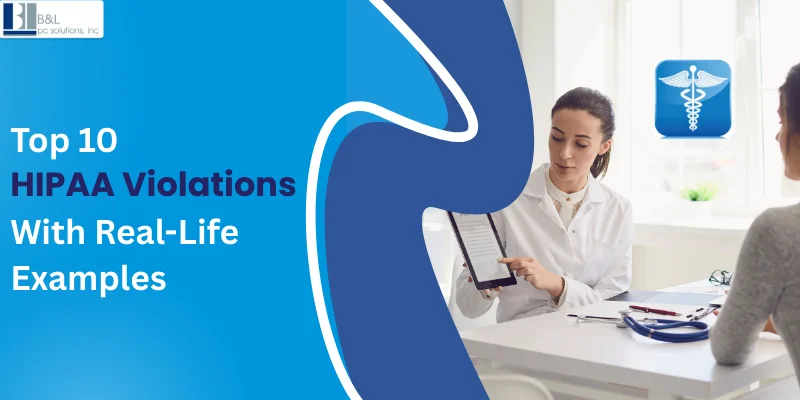
With increasing crime rates and private data breach, it is important for every sector to have a strict law and healthcare is no different. The Health Insurance Portability and Accountability Act also known as HIPAA is responsible for safeguards sensitive patient data in the US healthcare sector. According to this law, people who are involved in the healthcare sector need to follow strict criteria to avoid HIPAA violations. This makes it easier to protect patient data and alert individuals when their information is compromised.
If one breaks the HIPAA rules, rules have some serious repercussions like hefty penalties , loss of consideration and loss of reputation of the healthcare institute. Despite being aware of the HIPAA regulations and having witnessed instances of HIPAA violations, many healthcare companies have experienced privacy violations and information breaches as a result of ignorance or the loss of security measures.
Let us take a look at all the HIPAA violation and their real-life examples, with exact reasons and case references.
Top 10 HIPAA Violations with Real-life Examples
Take a look at all the HIPAA violation examples that help your healthcare organization to safeguard you from high penalties.
1. Unauthorized Access to Patient Records
One of the most common HIPAA violation examples is unauthorized access to patient information. Healthcare personnel regularly snoop into the scientific records of high-profile patients out of curiosity or for personal advantage. This violation can result in extreme penalties and termination of employment.
To prevent this, implement role-based access control to view the patient records and also conduct regular audits to identify and check out unauthorized admissions.
Case 1: UCLA Health System Fined $865,000
UCLA Health System was fined $865,000 in 2011 after workers regularly accessed one of the celebrity patients' personal documents without authorization. A severe punishment was imposed after the investigation discovered a pattern of extended unlawful access.
2. Medical Records Getting Lost or Misplaced
Physicians and health facility individuals often carry affected person records on laptops, mobile devices, and tablets. While that is essential for daily operations, it poses a threat if these devices are misplaced or stolen. Without proper encryption and password protection, personal records may be uncovered.
To keep the medical records safe, use encryption and password protection on all the devices . In addition to this, implement multi-element authentication (MFA) for delivered security.
Case 2: Children’s Medical Center in Dallas Fined $3.2 Million
In 2017, Children’s Medical Center in Dallas suffered a HIPAA violation after a stolen Blackberry device containing the PHI of 3,800 patients was never password-protected nor encrypted. The organization paid $3.2 million in fines for mishandling affected person records and failing to adopt enough safety features.
3. Failure to Encrypt Data
Encryption is a key requirement under HIPAA to shield sensitive patient data. Many healthcare carriers fail to implement encryption protocols, leaving data at risk of breaches. To prevent that, encrypt all data saved on transportable devices and servers. Plus, regularly update encryption protocols to save you from cyber threats.
Case 3:Advocate Health Care Fined $5.55 Million
In 2016, Advocate Health Care was fined $5.55 million after unencrypted laptops containing the ePHI of over 4 million patients were stolen. The lack of encryption caused one of the most significant HIPAA settlements in records.
4. Improper Disposal of Patient Information
Improper disposal of patient records, hard drives, and other PHI belongings can reveal sensitive facts. Organizations must ensure that PHI is securely destroyed to prevent any type of breaches.To save yourself and your healthcare institute, shred paper data before disposal and in case of digital data use data-wiping software to delete data.
Case 4: CVS Pharmacy Fined $2.25 Million
Due to their unlawful disposal of patient data, including prescription information, CVS Pharmacy was fined $2.25 million in 2009. Documents were located in open dumpsters, exposing sensitive patient facts.
5. Employee Snooping on Patient Information
Employees snooping on patient data is an extreme HIPAA violation. Whether driven by interest or malicious intent, unauthorized access to PHI can result in huge fines and termination. It is easy to prevent by conducting employee education on HIPAA compliance
Case 5: Memorial Healthcare System Fined $5.5 Million
2017 Memorial Healthcare System paid $5.5 million after personnel accessed PHI without authorization. The loss of an effective audit system allowed improper access for almost 12 months.
6. Unsecured Communication Channels
PHI transferred over unencrypted or insecure communication channels can be intercepted, leading to a data breach. Emails, textual content messages, and report-sharing structures must be secured. To protect that, use encrypted communication platforms for transmitting PHI and also implement secure file-sharing protocols to keep away from any type of data breaches.
Case 6: North Memorial Health Care Fined $1.55 Million
In 2016, North Memorial Health Care paid $1.55 million in fines after a commercial enterprise partner’s employee left unencrypted PHI data on a stolen laptop. This violation exposed the records of nearly 9,497 individuals.
7. Lack of Business Associate Agreement (BAA)
A Business Associate Agreement (BAA) is needed between healthcare providers and providers that handle PHI. Without a BAA, disclosing patient records to third events violates HIPAA. Keep everything safe in your hands, to ensure all providers dealt with PHI signal a BAA. In addition to this, regularly review agreements to ensure compliance.
Case 7: Raleigh Orthopaedic Clinic Fined $750,000
A $750,000 punishment was imposed on Raleigh Orthopaedic Clinic in 2016 for failing to acquire a business associate agreement (BAA) prior to sharing PHI with a third-party vendor. This oversight brought about a full-size violation.
8. Improper Disclosure of PHI to Media
Disclosing PHI to the media or third parties without patient consent is a direct HIPAA violation. Organizations should obtain the patient's authorization before allowing the media to access the information. To prevent this, obtain written consent before sharing any patient’s data.
Case 8: New York-Presbyterian Hospital Fined $2.2 Million
In 2016, NewYork-Presbyterian Hospital paid $2.2 million after allowing a TV crew to film patient interactions for the show “NY Med” without obtaining proper authorization.
9. Delayed Breach Notification
Within 60 days of learning of a data breach, businesses are required under HIPAA to notify patients and the Department of Health and Human Services (HHS). Delays in reporting can result in fines. To prevent, develop a breach notification plan, and ensure timely reporting of any security incidents.
Case 9: Presence Health Fined $475,000
In 2017, Presence Health paid $475,000 in fines after failing to notify HHS and affected people approximately a data breach involving information facts, which impacted over 800 sufferers.
10. Inadequate Security Measures
Failing to implement adequate security features to guard PHI is a violation of HIPAA’s Security Rule. Organizations ought to ensure data safety through everyday threat checks and security protocols. Always take care to conduct periodic security checks and update security protocols to deal with any new type of threats.
Case 10: Anthem Inc. Fined $16 Million
In 2018, Anthem Inc. suffered a records breach that exposed the PHI of almost 80 million individuals. The research discovered insufficient security protocols, resulting in a record fine of $16 million.
Read More Blog : All About HIPAA Compliance Software: Features, Pros and Cons
Final Thoughts
After checking out the above-mentioned HIPAA violation examples that can arise because of negligence, loss of education, or insufficient security measures. Now, the main aim of your healthcare institute should focus on safeguarding your data and getting the best of technology to save from any type of data threats.
Learning from real-life HIPAA violation examples helps corporations identify ability risks and take preventive actions. Healthcare organizations may protect patient records and steer clear of costly fines by encrypting sensitive data, enforcing stringent entry rules, and upholding appropriate security procedures.
Consider collaborating with BLPC, a reputable IT service provider in Long Island and Cyber Security Consultant Long Island, if your business needs help with HIPAA compliance in order to maintain compliance and safeguard private information.
Tags: Cybersecurity In Healthcare, DataBreach, Healthcare Compliance, Healthcare Security, HIPAA compliance, HIPAA Lessons, HIPAA Violation Examples, HIPAA Violations, HIPAA Violations with Real-life Examples





